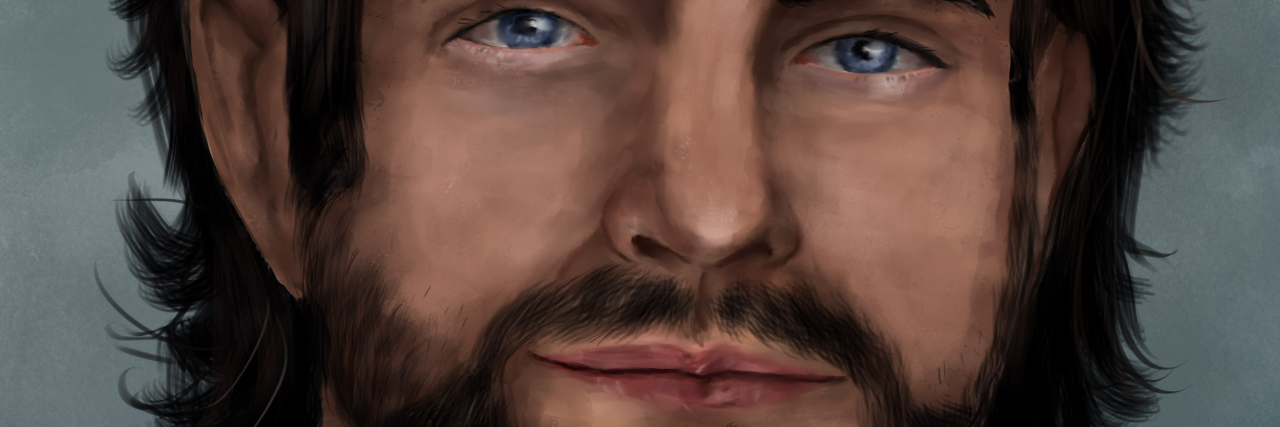Scott stands at roughly 6 feet tall, average build, thick black hair and icy blue eyes. He has a certain warmth about him, a compassionate and caring nature, and a charm that is hard to ignore. In the years I have known Scott I would call him a brother, a mentor, but more importantly, a friend. So why is it that I never really talk about Scott? Scott is, for lack of a better term, “not real.”
I was perhaps 13 years old when Scott came into my life. I had been struggling with horrible depression and was living very much in a dissociated state. I had started hearing voices and seeing things that previous year and all the voices I had heard were aggressive and threatening. So when Scott appeared, I couldn’t help being a little apprehensive, but it soon became clear that Scott was different. A kind, supportive voice that seemed to balance out the negative. I told no one about him. I hadn’t even told people that I was hearing voices or that I was feeling depressed. I think people noticed that I was withdrawn and quiet, but it seemed reasonable in their mind to dismiss it as part of being an adolescent. I felt incredibly isolated knowing that no one could understand what I was going through. Nothing in this world even felt real. Ironically, the only thing that felt real were the voices.
Needless to say, school was almost impossible to survive and upon reflection, I’m still not sure how I did. A time that is often so fraught with hardship, hormones and growing pains, I managed to make it through the other side despite the voices (one of which was always angry, always threatening, always showing and telling me horrible things) and the loneliness. It took me a good three years before I actually spoke to a mental health professional about this. What held me back I’m still not sure. Fear of not being believed? Fear of them telling my parents? How would my parents react to such a thing? Would I need to be put in hospital? Would I been seen as a danger to society? Would people think I’m “crazy?” Would people accept that some of the voices, Scott in particular, were my friend(s) and be OK with that or would they ridicule me?
Getting help has been difficult, although it did lift a massive weight off of my shoulders. In all honesty, I haven’t really found the mental health system to have been that helpful in my case. Perhaps I just haven’t found the right sort of support for me, but I have found my own ways of coping (for the most part, that is) with some of my symptoms.
Scott grew up, as did I, but here we are, still very much in each others lives. An interesting thing to mention is how Scott does indeed age (all of my voices do) and I communicate with him as you would any other person. It’s a little embarrassing to admit that at 24 years of age I have “imaginary friends,” voices that speak to me, comfort me, guide me, give me advice and, on the flip side, voices that make me paranoid, insult me, upset me and alienate me from others. Scott though is certainly a friend. My best friend.
As most of us know, mental health is still widely misunderstood and riddled with stigma, but when it comes to hearing voices, I feel like we are even more left in the shadows. People can empathize with what it feels like to be sad and lonely, or to be anxious and scared, but when the topic of hearing voices, hallucinations, psychosis or schizophrenia comes up, people are fearful. For so long the idea of hearing voices has been synonymous with straight jackets and serial killers, members of society we would prefer to believe don’t exist. I’ve seen many people share posts on social media making others aware of depression, anxiety and mood disorders, but never psychosis, schizophrenia or schizoaffective disorder, and the number of people who still confuse schizophrenia with dissociative identity disorder (otherwise known as multiple personality disorder) is problematic.
My goal now is to talk more openly, to share my experiences and hope that those who are too afraid to speak up are able to find their own voice. Using art, animation and writing, I’ve come to gradually allow more and more of my experiences to come out. Of all the things I’ve had to overcome, this is something I still feel incredibly shy about. I talk quite openly online, but I am shielded behind a screen and can take comfort in that. I hope for there to be more resources for those going through this, both in terms of practical support and education as well as information for friends and family members and within school settings to help build a more compassionate environment.
Lead image via contributor

